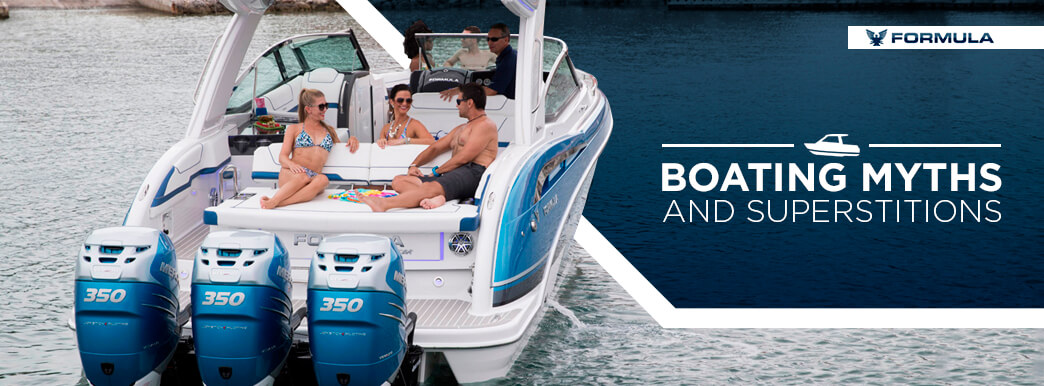
Since ancient times, sailors have traversed the open ocean for fishing, trading and exploration. Because these early mariners faced great dangers and uncertainties, they put their faith in superstitions, omens and luck to protect them and guide them home safely. Sailors’ superstitions gave them a sense of control as they braved the unpredictable seas.
Although boating is much safer today, many seafarers still take these nautical superstitions with more than just a grain of sea salt. Let’s dive into some of the strangest boating myths and superstitions.
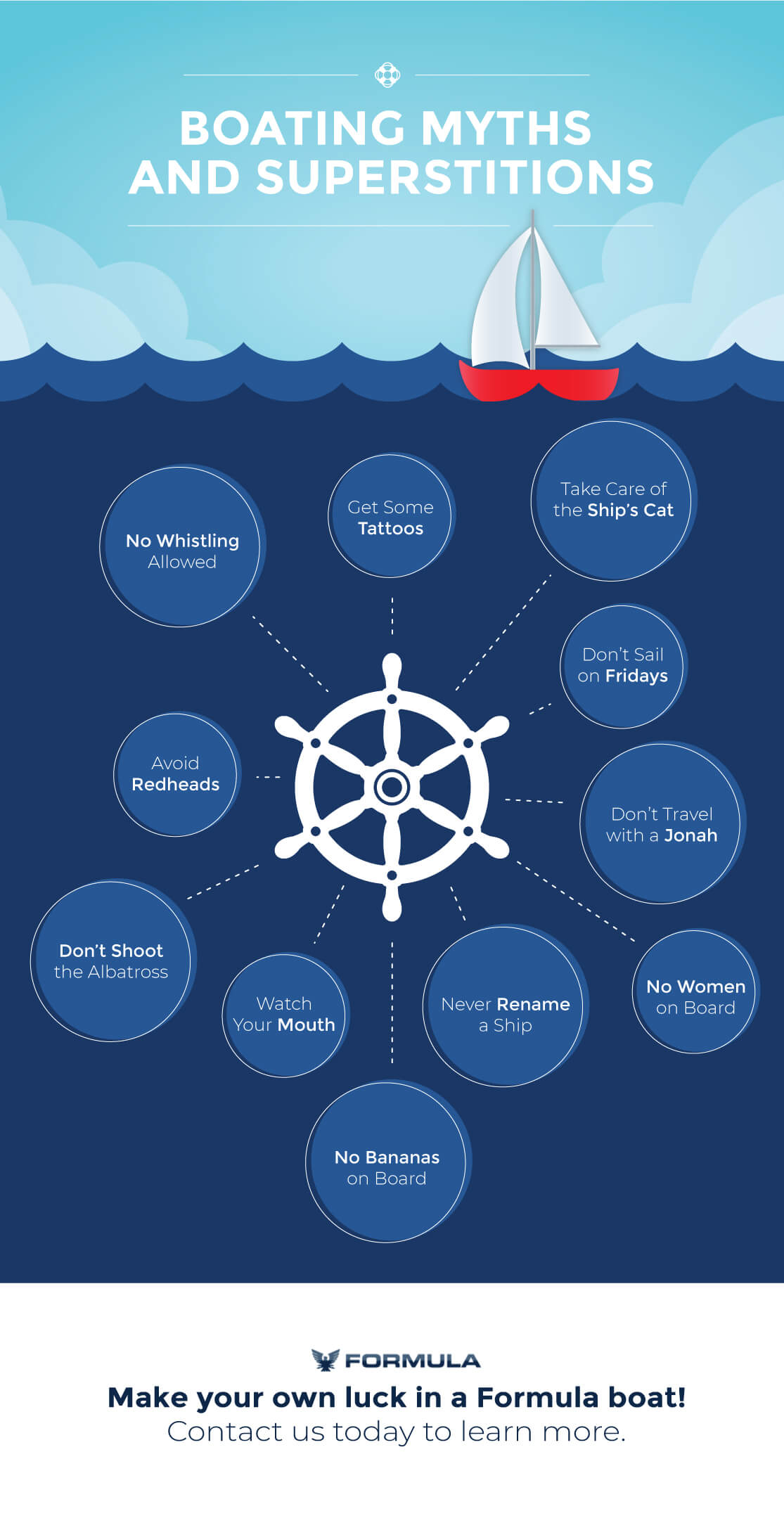
Boating Myth #1: No Whistling Allowed
Sailors commonly believed that whistling aboard a boat would bring bad weather. Whistling was said to challenge the wind and cause it to increase, which could bring in a storm. Singing on a boat may also have been forbidden for the same reason. However, if sailors were stuck on windless waters, they may have whistled in hopes of coaxing a breeze to blow them onward.
This belief of “whistling up a storm” was not the only sailors’ superstition regarding weather. Some seafarers also believed that clapping on board would bring thunder and throwing stones into the ocean would cause storms with large ocean swells. Mariners were also wary of bringing an umbrella onto a ship. Because umbrellas are used in bad weather, it was seen as tempting fate to bring one on board. To protect against storms and other misfortunes, sailors sometimes nailed a horseshoe to the ship’s mast.
Boating Myth #2: No Bananas on Board
One of the more unusual nautical superstitions that still persists today is that bananas are bad luck to bring aboard a ship, especially a fishing vessel. This belief allegedly began during the 1700s, when many trading ships disappeared while sailing between the Caribbean and Spain. Some mariners blamed the bananas they were transporting for the ships getting lost at sea.
Fisherman also believed that traveling with bananas on board meant they would not catch any fish. This belief may have stemmed from the fact that ships transporting bananas had to sail as quickly as possible or the bananas would spoil before reaching their destination. Because the ships were sailing so quickly, fisherman attempting to fish by trolling rarely caught anything.
Sailors may also have feared bananas for several other reasons. Bananas release ethylene gas which causes other fruits like melons and apples to ripen more quickly when they are stored together. Before the science behind this phenomenon was understood, seafarers transporting fruit believed the bananas caused bad luck which caused the other fruits to go bad.
Crates of bananas may also have harbored dangerous pests like poisonous spiders and snakes that would bite sailors and cause them to die suddenly. Lastly, when heavy cargo ships sunk, legend has it that only the curved yellow fruits would be found floating on the surface of the water. Seafarers believed the bananas had caused the ship to sink.
Boating Myth #3: No Women on Board
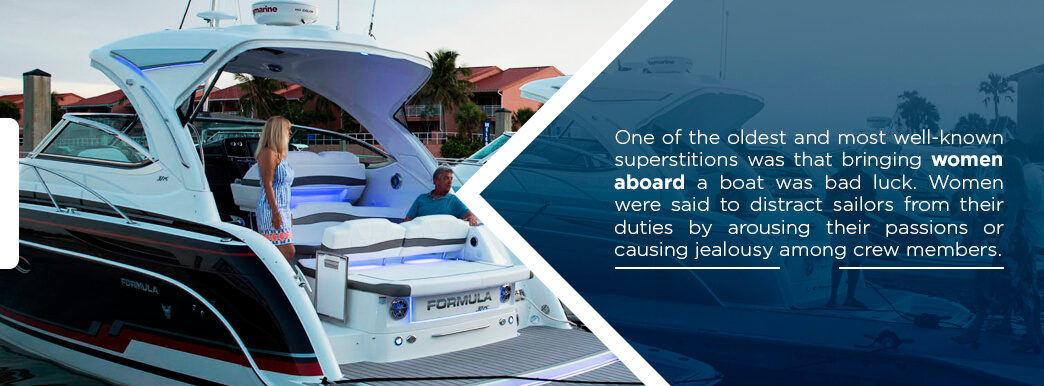
One of the oldest and most well-known superstitions was that bringing women aboard a boat was bad luck. Women were said to distract sailors from their duties by arousing their passions or causing jealousy among crew members. When the crew was distracted, this would anger the ocean and cause bad weather or other revenge from the sea gods. Luckily, this nautical superstitions has been put to rest, and women can now serve in the Navy and on fishing vessels without any concern of bad luck.
Early sailors also attributed strange sounds they heard at sea to sirens, which are mythical creatures that are half-woman and half-bird. Sirens were fabled to lure sailors to their deaths by singing sweet songs that drew them into treacherous waters. Other mariners blamed strange sea noises on mermaids that are half-woman and half-fish performing the same deceptive songs as sirens.
Ironically, naked women were believed to calm the sea rather than agitate it. This is the reason that many ship figureheads depict women with bare breasts. The watchful eyes of the female figureheads were also believed to guide the ship to safety. The ship itself was also referred to as “she,” because it acted as a protective mother that sheltered the sailors from an angry sea.
Boating Myth #4: Avoid Redheads
People with red hair were also believed to be unlucky. Redheads were not welcome aboard ships and were avoided by sailors before beginning a journey. If a sailor met a red-headed person before boarding a ship, the sailor had to speak to the redhead before the redhead spoke to them. This would mitigate the bad luck of encountering a redhead before setting sail.
Boating Myth #5: Watch Your Mouth
Although sailors are notorious for using foul language, there are some words that seafarers avoided because they were believed to bring bad luck. Saying the word “drown” while on a boat was believed to summon the event itself. “Good luck” and “goodbye” were also forbidden, and it was unlucky for sailors’ wives to wave goodbye or call after their husbands once they left the house for a sea journey. Other words pertaining to land brought bad luck if mentioned while at sea, such as pigs, foxes, rabbits and church. Swearing while fishing was also seen as bad luck.
Boating Myth #6: Never Rename a Ship
After a ship is named and christened, changing the name of a ship is considered bad luck. This may be because sailors believed their boats took on a mind of their own once they were named. Another explanation is that renaming a ship meant you were trying to trick the gods of the sea. According to legend, each ship’s name was recorded in his “Leger of the Deep,” so changing the name without notifying Neptune, the God of the Sea, would incur his wrath.
The most practical explanation for not renaming a ship was that early trading ships developed reputations at ports based on their names. Changing the name of a ship could cause problems for the captain and crew while traveling and trading.
If a ship must be renamed, a de-naming ceremony is necessary before christening the boat again, according to superstition. This ceremony typically involves writing the original name of the ship on a piece of paper, folding it and placing it into a box. The box should then be burned and the ashes should be thrown into the sea when the tide is going out. If the ceremony is performed away from the shore, the ashes can be thrown in a river to float downstream or in a lake at night during a full moon.
A ship de-naming ceremony could also include removing all traces of the old name of the boat, including the logbook, paperwork and even the writing on the hull. After the official de-naming ceremony, the boat can be christened again with its new name.
Boating Myth #7: Don’t Sail on Fridays
Some superstitious seafarers avoid sailing on certain days to protect against bad luck. Friday has historically been considered a bad day for setting sail because it is the day that Jesus Christ was crucified. Thursdays are also believed to be unlucky sailing days because it is the day of Thor, the god of thunder and storms.
Other unlucky days for sailing based on biblical history include:
- – The first Monday in April, which is the day that Cain killed his brother Abel
- – The second Monday in August, which is the day that Sodom and Gomorrah were destroyed
- – December 31, which is the day that Judas Iscariot committed suicide
Many seafarers avoided setting sail on these days, and the most superstitious sailors only set sail on Sundays, which were regarded as a lucky day for sailing.
Boating Myth #8: Don’t Travel With a Jonah
Based on the story of the biblical prophet Jonah, any person or object that brought bad luck to a ship was sometimes called a “Jonah.” In the biblical tale, the prophet Jonah receives orders from God to sail to the city of Nineveh, but instead, he sails the opposite direction out of fear. God punished Jonah by bringing violent storms to his ship and the rest of the crew threw him overboard to appease the seas.
Any person perceived to be a “Jonah” would be thrown off the ship as soon as possible.
Boating Myth #9: Don’t Shoot the Albatross
Anyone who is familiar with Samuel Taylor Coleridge’s poem The Rime of the Ancient Mariner knows that killing an albatross can bring serious bad luck. In Coleridge’s poem, numerous perils and misfortunes befall a ship after one of its crew members shoots a friendly albatross that visited the boat. Seabirds were believed to carry the souls of deceased sailors, so it was a good omen to see one, but very unlucky to kill one.
Boating Myth #10: Take Care of the Ship’s Cat
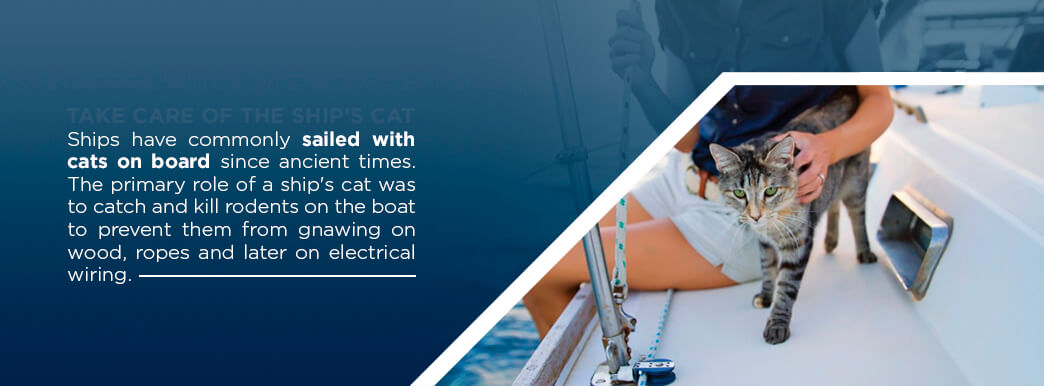
Ships have commonly sailed with cats on board since ancient times. The primary role of a ship’s cat was to catch and kill rodents on the boat to prevent them from gnawing on wood, ropes and later on electrical wiring. Cats would also prevent vermin from eating food stores or damaging cargo like grains. Rodents also carried and spread diseases, such as the Black Death.
Because cats helped control the rodent problem on ships and also provided a sense of companionship, cats were believed to bring good luck. If a ship’s cat came up to a sailor, that was a good omen. If the cat approached and then turned away, it was a bad omen. For this reason, seafarers kept their ship’s cats well-fed and content. Wives of fishermen sometimes kept black cats at home to protect their husbands while at sea.
While some of the good luck associated with cats on ships was based in reason, other superstitions surrounding ship’s cats were not. Some mariners believed that cats had magical powers stored in their tails that could control the weather. Cats were believed to protect ships from storms, but also to summon storms if the cat fell or was thrown overboard. If the ship did not sink during the storm, it was cursed with bad luck for nine years.
Sailors also believed a few other unusual nautical superstitions surrounding cats:
- – A ship’s cat sneezing meant that it was going to rain.
- – A frisky ship’s cat was an omen of a windy day.
- – A ship’s cat that licked its fur against the grain signaled that a hailstorm was on its way.
While these sailors’ superstitions may sound absurd, they are actually somewhat based in reality. Due to their sensitive inner ears, cats are able to detect changes in weather more acutely than other animals. Cats can sense the low atmospheric pressure that often comes before storms at sea, and this may cause them to act restless or nervous.
Boating Myth #11: Get Some Tattoos
Because early sailors believed strongly in the power of symbols and omens, they often tattooed specific images on their body to bring good luck or to repel misfortune. Seafarers often had a tattoo of a nautical star or compass rose that was believed to help guide them home.
Sailors also tattooed pictures of roosters or pigs on their feet to protect them from drowning. Many early sailors could not swim, and they believed that the gods would have mercy on them during a shipwreck if they saw the images of animals on their feet. The gods would see the roosters or pigs and scoop the sailors from the water to place them safely back on land.
This superstition may have developed due to the fact that after a shipwreck lighter livestock like roosters and hens would often survive because their crates would float in the ocean.
Other Nautical Omens
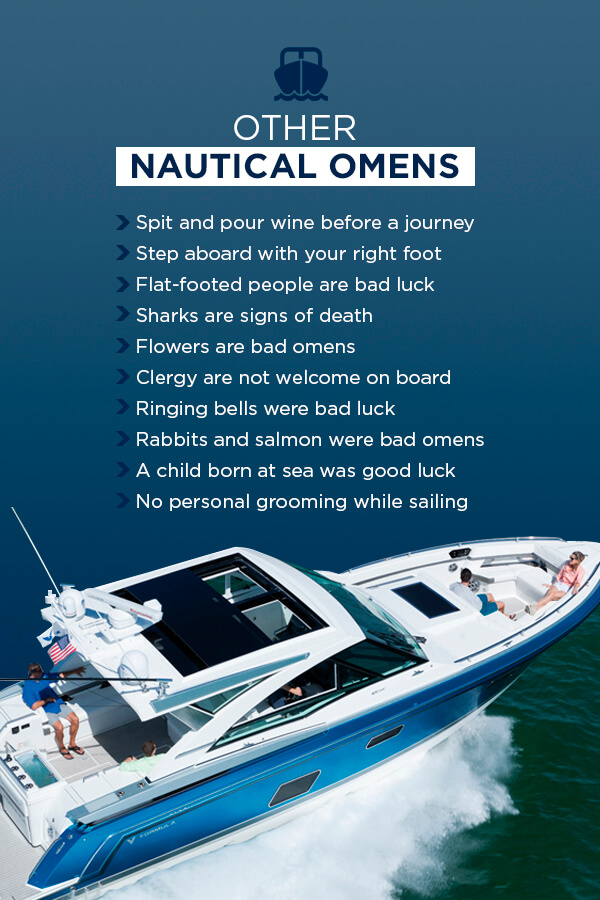
In addition to the more elaborate nautical superstitions, sailors around the world believed in many other good and bad luck charms and omens. These are just a few more common sailors’ suspicions:
Spit and pour wine before a journey: To bring good luck, sailors often spit into the ocean before setting sail. For a long journey, pouring wine on the deck would bring good fortune.
Step aboard with your right foot: Stepping onto a ship with your left foot was unlucky, so sailors always boarded with their right foot first.
Flat-footed people are bad luck: Like redheads, people with flat feet were avoided before a voyage and were not welcome aboard ships.
Sharks are signs of death: A shark following the ship was perceived as a sign of inevitable death. However, the real reason that sharks followed ships was likely to eat any fish or food remnants that were accidentally dropped overboard.
Flowers are bad omens: Because flowers were associated with funerals and wreaths on graves, they were never brought onto ships. If a sailor’s wife tried to bid him farewell with a gift of flowers, the bouquet was quickly thrown overboard.
Clergy are not welcome on board: Because of the same connection to funerals, clergymen and priests were not welcome aboard ships.
Ringing bells were bad luck: Any sound that resembled bells ringing at a funeral was also perceived as an omen of death, such as the sound of a wine glass ringing, which had to be stopped immediately. This even included the sound of the ship’s bells ringing if they rang of their own accord, such as during a storm or in heavy winds.
Rabbits and salmon were bad omens: If fishermen found a salmon or rabbit on their boat, they would often skip sailing for the day and stay home instead.
A child born at sea was good luck: Contradicting the belief that a woman aboard a ship was bad luck, a child that was born at sea was considered an omen of good luck.
No personal grooming while sailing: Mariners often looked shaggy while at sea because trimming your nails, shaving your beard and cutting your hair were also believed to bring bad luck to the ship.
Although these early nautical superstitions may seem fantastical today, many sailors still regard these myths as carrying some merit. You may still see an old tattooed seaman spit before boarding his vessel or be asked to discard any bananas before bringing your cooler onto a ship. When you set sail on your boat, you may want to leave the whistling behind and put your right foot forward for good fortune on the water.
Find Favorable Seas on Your Formula Boat
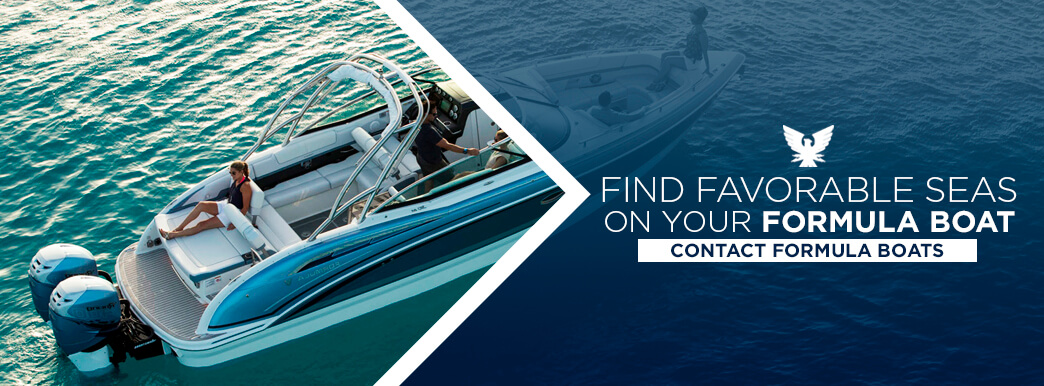
Whether you believe in old sailors’ superstitions or fancy yourself a more practical mariner, we believe you can make your own luck in a Formula boat. By choosing today’s premier powerboat, you can enjoy favorable waters with comfort and ease. Formula boats are built with high-quality materials and sleek designs to provide unparalleled performance, reliability and enjoyment. Explore our collection of luxury powerboats or contact Formula Boats to learn more.
